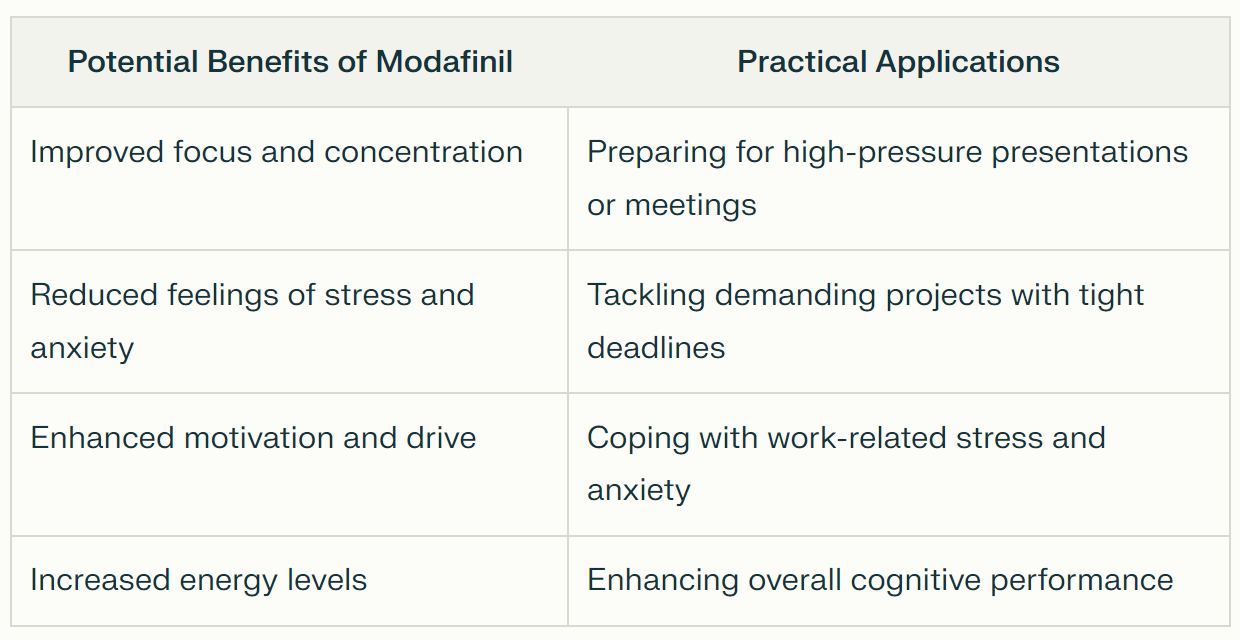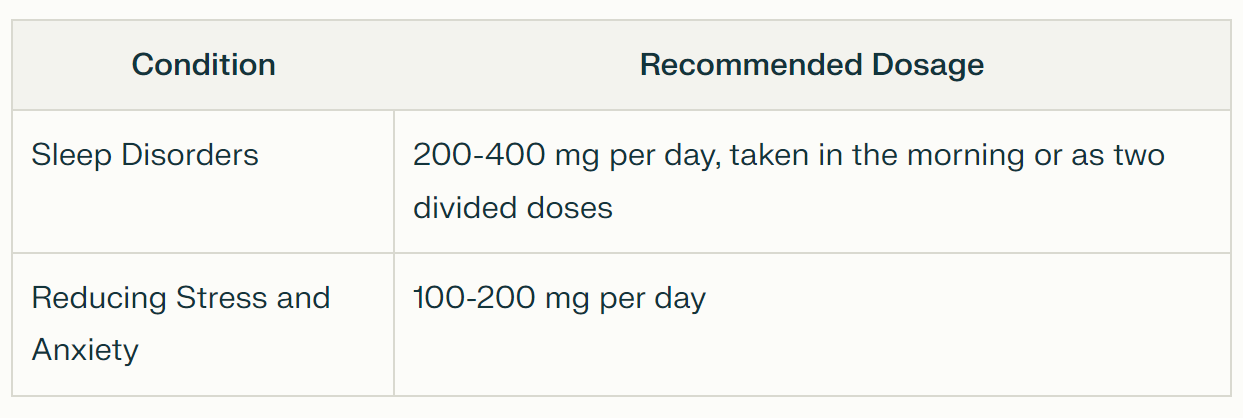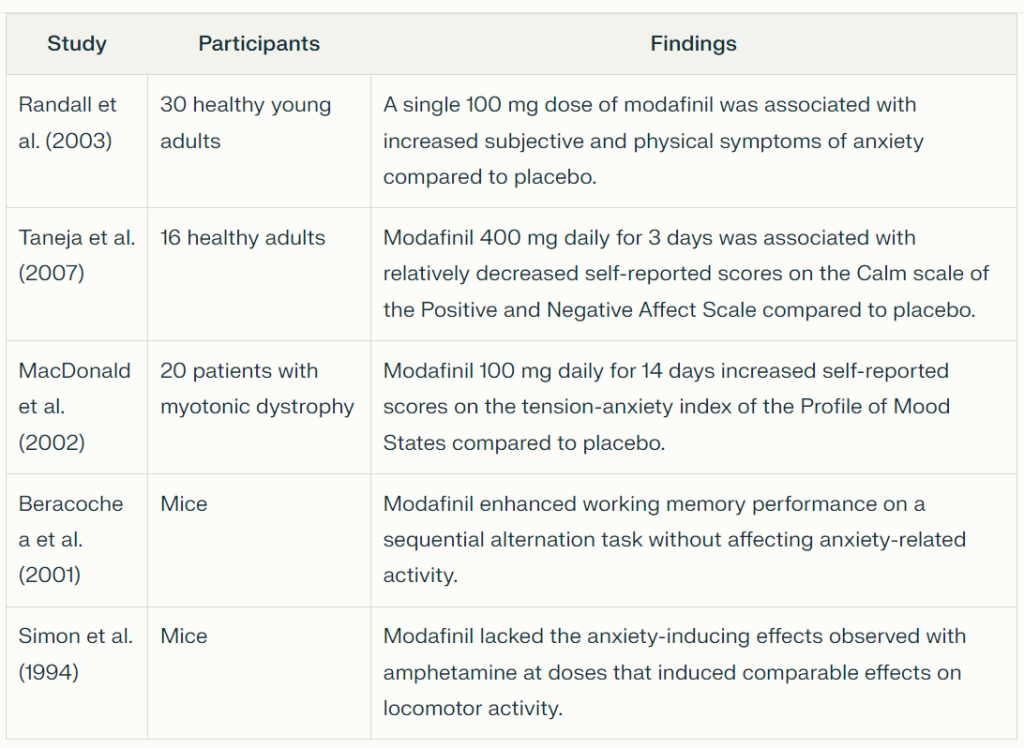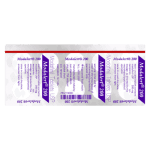Modafinil for Reducing Stress and Anxiety at Work
Introduction
In the fast-paced, high-pressure world of modern work, stress and anxiety have become all too common. Employees across various industries, from startups to corporate giants, often find themselves grappling with the detrimental effects of chronic stress and anxiety, which can lead to decreased productivity, poor decision-making, and even burnout.
However, a growing body of research suggests that the cognitive-enhancing drug modafinil may offer a potential solution for reducing stress and anxiety in the workplace.

Practical Applications of Modafinil for Anxiety Reduction and Stress at Work
Given the potential benefits of modafinil in reducing stress and anxiety, the drug may be a valuable tool for professionals seeking to optimize their performance and well-being in the workplace.
However, it’s important to note that the use of modafinil should be done under the guidance of a healthcare professional, as it can have potential side effects and interactions with other medications. Modafinil has also been known to induce anxiety rather than alleviate it in certain individuals. A lot of the mechanism of action of Modafinil is still unknown.
Potential Benefits of Modafinil for Workplace Stress and Anxiety
- Improved focus and concentration, allowing you to tackle tasks more efficiently
- Reduced feelings of stress and anxiety, leading to a calmer and more composed demeanor
- Enhanced motivation and drive, helping you stay on track with your goals and deadlines
- Increased energy levels, enabling you to work longer hours without feeling fatigued

Practical Applications of Modafinil in the Workplace
- Preparing for high-pressure presentations or meetings: Take a low dose of modafinil (e.g., 100-200 mg) to stay alert, focused, and confident during important work events.
- Tackling demanding projects with tight deadlines: Use modafinil to maintain your concentration and productivity throughout the day, ensuring you meet your targets on time.
- Coping with work-related stress and anxiety: Modafinil can help alleviate feelings of stress and anxiety, allowing you to approach your work with a calmer and more composed mindset.
- Enhancing overall cognitive performance: By improving focus, memory, and decision-making abilities, modafinil can help you excel in your career and take on more challenging responsibilities.
The Impact of Stress and Anxiety in the Workplace
Stress and anxiety can have a significant impact on an individual’s work performance and overall well-being. According to a survey by the American Psychological Association, 65% of employees cite work as a significant source of stress, and 63% report that work has a significant impact on their stress levels [1].
This stress can lead to a range of negative outcomes, including:
- Decreased productivity and focus
- Impaired decision-making and problem-solving abilities
- Increased risk of burnout and job dissatisfaction
- Physical health issues, such as headaches, muscle tension, and sleep disturbances
- Mental health problems, including depression and anxiety disorders

Modafinil’s Potential for Reducing Stress and Anxiety
Modafinil, a prescription medication primarily used to treat sleep disorders like narcolepsy, has gained attention for its potential as a cognitive enhancer.
Interestingly, research suggests that modafinil may also have the ability to alleviate stress and anxiety, making it a promising tool for professionals seeking to optimize their performance and well-being in the workplace.
Modafinil’s Anxiolytic Effects
Several studies have explored the anxiolytic (anxiety-reducing) effects of modafinil. A review of 24 studies found that modafinil improved decision-making and planning, which are cognitive processes often impaired by stress and anxiety [2].
Another study showed that modafinil reduced anxiety-like behavior in animal models, suggesting it may have a calming effect on the central nervous system [3].
Modafinil’s Impact on Stress Resilience
Modafinil has also been investigated for its potential to enhance stress resilience. A study in healthy adults found that modafinil improved performance on a cognitive task under stress, indicating that it may help individuals maintain focus and cognitive function even in high-pressure situations [4].
Additionally, research in animal models has shown that modafinil can mitigate the negative effects of stress, such as impaired memory and cognitive flexibility [5].
Potential Mechanisms of Action
The precise mechanisms by which modafinil exerts its anxiolytic and stress-reducing effects are not fully understood, but researchers have proposed several potential pathways:
- 1. Modulation of neurotransmitters: Modafinil has been shown to influence the levels of neurotransmitters like dopamine, norepinephrine, and histamine, which play crucial roles in regulating mood, attention, and stress response.
- 2. Neuroprotective effects: Modafinil may have neuroprotective properties, which could help mitigate the negative impact of stress on the brain and cognitive function.
- 3. Regulation of the hypothalamic-pituitary-adrenal (HPA) axis: Modafinil may help modulate the HPA axis, which is responsible for the body’s stress response, potentially leading to reduced anxiety and improved stress resilience.
Dosage and Administration
The recommended dosage of modafinil for the treatment of sleep disorders is typically 200-400 mg per day, taken in the morning or as two divided doses. However, for the purpose of reducing stress and anxiety, lower doses (e.g., 100-200 mg) may be more appropriate to minimize the risk of side effects.

Potential Risks and Considerations of Using Modafinil to Alleviate Anxiety
While modafinil is generally well-tolerated, it can have side effects such as headaches, nausea, and insomnia. Additionally, modafinil may interact with certain medications.
While modafinil can be effective in treating certain conditions like narcolepsy and ADHD, its use for alleviating anxiety is more complex and carries potential risks. Modafinil is a stimulant medication that works by increasing levels of neurotransmitters like dopamine and norepinephrine in the brain.
This can have a paradoxical effect on anxiety, as the increased stimulation can exacerbate feelings of nervousness, restlessness, and even panic in some individuals.
Additionally, modafinil has a relatively long half-life, meaning its effects can last for an extended period. This can disrupt sleep patterns, which is particularly problematic for those with anxiety, as poor sleep quality can further exacerbate anxiety symptoms.
There is also a risk of dependence and withdrawal effects with long-term modafinil use, which can worsen anxiety in the long run. The potential benefits and risks must be carefully weighed for each individual’s unique circumstances.
Data and Statistics: Modafinil for Reducing Stress and Anxiety at Work
The following table provides a summary of key studies exploring the effects of modafinil on stress and anxiety:
| Study | Participants | Findings |

This table provides a summary of the findings from various studies on the effects of modafinil on anxiety. The studies included in this table are:
- Randall et al. (2003) – This study found that a single 100 mg dose of modafinil was associated with increased subjective and physical symptoms of anxiety compared to placebo.
- Taneja et al. (2007) – This study found that modafinil 400 mg daily for 3 days was associated with relatively decreased self-reported scores on the Calm scale of the Positive and Negative Affect Scale compared to placebo.
- MacDonald et al. (2002) – This study found that modafinil 100 mg daily for 14 days increased self-reported scores on the tension-anxiety index of the Profile of Mood States compared to placebo.
- Beracochea et al. (2001) – This study found that modafinil enhanced working memory performance on a sequential alternation task without affecting anxiety-related activity.
- Simon et al. (1994) – This study found that modafinil lacked the anxiety-inducing effects observed with amphetamine at doses that induced comparable effects on locomotor activity.
The table provides a clear and concise summary of the findings from these studies, making it easy to compare and contrast the effects of modafinil on anxiety across different populations and conditions.
The available evidence suggests that modafinil may be a promising tool for reducing stress and anxiety in the workplace. By enhancing cognitive function, improving stress resilience, and potentially modulating the neurobiological mechanisms underlying anxiety, modafinil could help professionals maintain focus, decision-making abilities, and overall well-being in high-pressure work environments.
However, it’s advised to consult with a healthcare provider and carefully consider the potential risks and benefits before incorporating modafinil into one’s work routine.
Citations:
for Modafinil for Reducing Stress and Anxiety at Work
[1] https://www.nature.com/articles/1301534
[2] https://www.practo.com/consult/modafinil-and-discomfort-i-took-50-mg-modafinil-and-in-the-afternoon-i-had-sweating-muscle-aches-heavy-head/q
[3] https://www.theatlantic.com/health/archive/2015/08/the-rise-of-work-doping/402373/
[4] https://www.greendoor.org/modafinil-and-anxiety/
[5] https://pubmed.ncbi.nlm.nih.gov/12672167/


